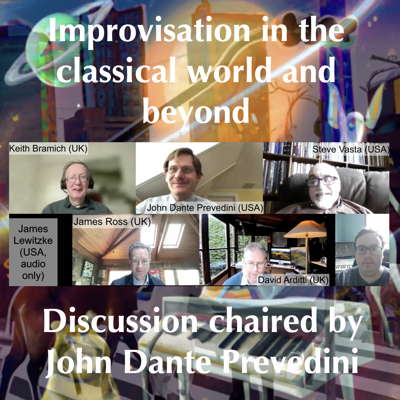 CENTRAL ENGLAND: Mike Wheeler's concert reviews from Nottingham and Derbyshire feature high profile artists on the UK circuit - often quite early on their tours.
CENTRAL ENGLAND: Mike Wheeler's concert reviews from Nottingham and Derbyshire feature high profile artists on the UK circuit - often quite early on their tours.
 DISCUSSION: John Dante Prevedini leads a discussion about Improvisation in the classical world and beyond, including contributions from David Arditti, James Lewitzke, James Ross and Steve Vasta.
DISCUSSION: John Dante Prevedini leads a discussion about Improvisation in the classical world and beyond, including contributions from David Arditti, James Lewitzke, James Ross and Steve Vasta.
- Igor Stravinsky
- Brian Holmes
- Tapiola Choir
- Hakeem Henderson
- James Rawson
- Hugh Thompson
- Costanza Principe
- Palestrina: Quodcumque Ligaveris
George Hurst
British conductor George Hurst was born in Edinburgh on 20 May 1926 to Romanian and Russian parents. He studied in Canada, at Toronto's Royal Conservatory of Music.
For ten years from 1958 he was chief conductor of the BBC Northern Orchestra (now the BBC Philharmonic), during which time he gave the first Manchester performance of Schoenberg's Gurre-Lieder and the first performance of Concerto lirico by Thomas Pitfield.
He created the Bournemouth Sinfonietta in 1968 and remained the group's artistic advisor until 1974. He also worked with the Bournemouth Symphony Orchestra, leading the first London performance of Malcolm Williamson's Symphony No 2 in 1969, and was principal guest conductor of the BBC Scottish Symphony Orchestra.
From 1960 until shortly before he died (on 15 September 2012, aged eighty-six), George Hurst taught conducting at the Canford Summer School of Music (now the Sherbourne Summer School of Music), creating the conducting course which now bears his name, and influencing, at one time or another, almost every student of conducting in the UK. He was also a visiting professor at the Royal Academy of Music in London.
Some have compared Hurst's uncompromising insistence on getting his own way with that of Sergiu Celibidache. The current writer - Keith Bramich, who met Hurst twice - remembers the freedom with which he entrusted members of his orchestras, and his grim warning to stick-waving time beaters that 'metronomes are cheaper than conductors'.

